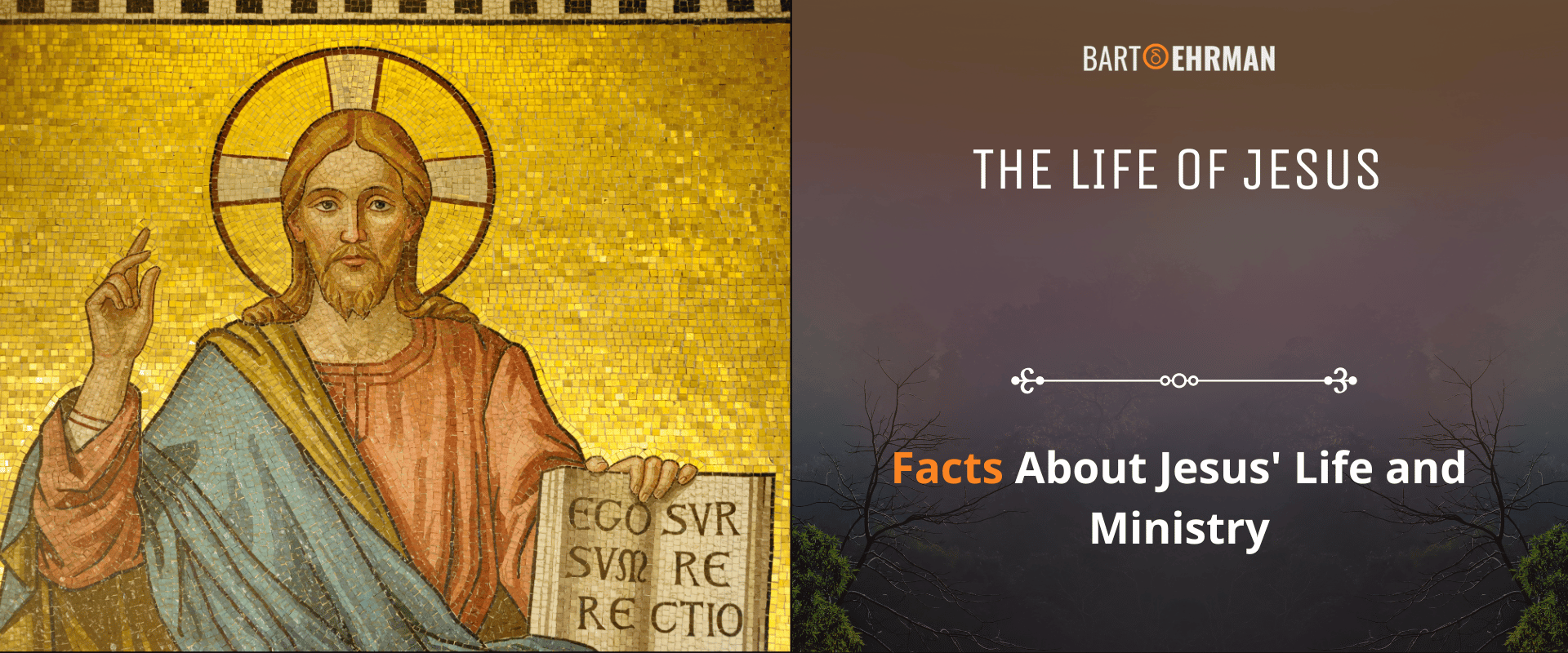The Life of Jesus: Facts About Jesus' Life and Ministry

Written by Marko Marina, Ph.D.
Author | Historian
Author | Historian | BE Contributor
Verified! See our guidelines
Verified! See our editorial guidelines
Date written: February 19th, 2024
Edited by Laura Robinson, Ph.D.
Disclaimer: The views and opinions expressed in this article belong to the author and do not necessarily match my own. - Dr. Bart D. Ehrman
If you enter the name "Jesus of Nazareth" into a Google search today, you'll encounter more than 27 million results, underscoring the undiminished relevance and profound impact of this historical figure in contemporary times.
This staggering digital footprint serves as a testament to the enduring significance of Jesus, not only within the realms of spirituality and religion but also across the vast expanse of cultural and historical discourse.
This article sets out to provide a concise summary of the key events of Jesus' life - his birth, baptism, ministry, including miracles and teachings, trial and crucifixion, and the accounts of his supposed resurrection—approached from a scholarly and historical perspective.
Quick Article Guide:
Our objective is not to delve into the exhaustive details of each event but to offer a clear, coherent, and concise overview that sketches the broad outlines of Jesus' life against the backdrop of 1st-century Judea.
We aim to navigate through the historical contexts and narratives that have shaped the understanding of Jesus of Nazareth, drawing upon historical evidence and scholarly research. This exploration is intended as an introduction to the life of Jesus, setting the stage for more detailed examinations of each segment of his life in subsequent articles.
For those intrigued by the critical exploration of the Gospel of Mark and its significance in understanding the life of Jesus, delve deeper with Dr. Bart D. Ehrman's course, "Jesus the Secret Messiah - Revealing the Mysteries of the Gospel of Mark."
This series of eight 30-minute lectures offers a scholarly analysis of who wrote the Gospel, when and why it was written, and uncovers the core message it conveys about Jesus. Join us to explore the historical context and profound mysteries of the earliest Gospel.

The Birth of Jesus: Where and When?
Sifting through the sources on the birth of Jesus from a scholarly standpoint presents a formidable challenge, as highlighted by Anthony Le Donne, who aptly notes: "Studying religious history is a very difficult task. It's often hard to tell which stories originated from human perception and which stories originated from legend. Indeed, sometimes it's a combination of both."
This observation underscores the complexities involved in disentangling the historical facts from the weave of legend and perception that characterizes much of the early narrative surrounding the life of Jesus.
The primary sources for information on Jesus' birth are the Gospels of Matthew and Luke. However, these accounts were composed several decades after Jesus' death, not by eyewitnesses but by followers who often mixed theological perspectives, distorted memories, and historical truths. If you want to know more about the authors of these Gospels, check out our earlier articles (here, and here).
Historically, the consensus among critical scholars suggests a divergence from the traditional narrative found in religious texts. Contrary to the popular tradition that places Jesus' birth in Bethlehem, scholarly analysis points to Nazareth as his likely place of birth.
This perspective is supported by a critical examination of the historical and textual evidence, taking into account the context in which these stories were written and the motivations behind their composition.
It's important to note that we've explored this topic in detail in another article, providing an in-depth look at the arguments and evidence supporting Nazareth as the more probable location.
The scholarly consensus also places Jesus' birth between 7 B.C.E. and 4 B.C.E., based on historical events and figures mentioned in the Gospels. This timeframe further illustrates the layers of complexity in reconstructing the historical landscape of the life of Jesus, highlighting the need for careful interpretation of the available sources.
Let’s take a look at other (historical) facts about Jesus, beginning with his baptism at the Jordan River!
The Life of Jesus: Baptism at the Jordan River
In the 1st century CE, Galilee was a region of vibrant cultural and religious diversity, under Roman rule, with Herod Antipas serving as the tetrarch from 4 BCE to 39 CE.
This period was marked by social tensions and a longing for spiritual renewal among the Jewish population, setting the stage for various apocalyptic movements, including that of John the Baptist and subsequently Jesus of Nazareth.
It was against this backdrop of Roman occupation and Jewish anticipation of messianic deliverance that Jesus began his public ministry, a ministry that would challenge both the political status quo and the religious expectations of the time.
The initiation of Jesus' ministry is virtually unanimously affirmed by critical historians to have begun with his baptism by John the Baptist. This event, occurring in the Jordan River, not only marks the beginning of Jesus' ministry but also signifies his acceptance and endorsement of John's message of repentance and baptism for the forgiveness of sins.
Helen Bond explains:
“The close connection between baptism and the removal of sin led to a certain embarrassment on the part of the earliest Christians in admitting that Jesus underwent the rite. Luke and John pass over the baptism very quickly (Lk 3.21–2, Jn 1.32–4), while Matthew adds a brief conversation in which John expresses his unworthiness to baptize Jesus (Mt 3.14–15). This very embarrassment, however, confirms the historicity of the event.”
Following his baptism, Jesus embarks on a mission of teaching, healing, and proclaiming the good news of the kingdom of God, actions that would draw both followers and critics, setting the path toward his eventual confrontation with the religious and political authorities of the day.
FREE COURSE!
WHY I AM NOT A CHRISTIAN
Raw, honest, and enlightening. Bart's story of why he deconverted from the Christian faith.
Over 6,000 enrolled!
The Life of Jesus: Ministry, Teachings and Miracles
In examining the ministry of Jesus of Nazareth, our approach does not aim to adjudicate the truthfulness of the alleged miracles attributed to him, as such evaluations lie outside the purview of historical analysis.
Instead, our focus is on summarizing the key aspects of the life of Jesus, which was characterized by a blend of teachings, parables, and reported miracles, all of which played significant roles in his appeal to the people of 1st-century Judea and Galilee.
Central to Jesus' ministry were his teachings, which often emphasized love, compassion, forgiveness, and a reversal of societal norms. For instance, in the Sermon on the Mount, Jesus articulates the Beatitudes, offering blessings to the poor in spirit, the meek, and those who hunger and thirst for righteousness (Matthew 5:3-10).
Among the central themes of Jesus' teachings was his emphasis on the coming of the Kingdom of God, a concept that permeated his messages and parables. This focus on the Kingdom represented a call to a transformative way of life, urging his followers to prepare for a divine intervention, the Judgment Day, and the establishment of a new era.
Another core aspect of his message is encapsulated in the commandment to "love your neighbor as yourself" (Mark 12:31), a directive that sought to broaden the scope of moral obligation beyond kinship and ethnicity.
Miracles attributed to Jesus, ranging from healings to exorcisms and control over natural phenomena, are extensively documented within the Gospels. Examples include the healing of the blind, the feeding of the five thousand, and calming a storm with a command.
While these acts are recorded as demonstrations of divine power and authority, they also functioned to underscore the themes of compassion and salvation that permeated his teachings. A more detailed exploration of Jesus' miracles, examining their historical context and the role they played in his ministry, will be the subject of an upcoming article.
However, Jesus' message and actions extended beyond gathering disciples and instilling compassion among his contemporaries. His proclamation of the coming Kingdom of God, coupled with his outspoken critique of the Temple authorities in Jerusalem, positioned him at odds with some of the most influential figures within the Jewish aristocracy.
This growing tension set the stage for the next phase in the life of Jesus - his arrest, trial, and execution.
The Life of Jesus: Arrest, Trial, and Execution
The life of Jesus, particularly towards its culmination, was marked by escalating opposition from both Roman authorities and certain factions within the Jewish aristocracy.
His teachings, especially those critiquing the Temple's practices and his bold proclamation of the coming Kingdom of God, increasingly alienated him from the established religious leadership in Jerusalem. This tension reached a turning point with Jesus' betrayal by one of his disciples, leading to his arrest in Jerusalem under the cover of night.
Following his arrest, Jesus faced a short trial which culminated in a decision by Pontius Pilate that would lead to Jesus’ execution by crucifixion - a common Roman method of capital punishment reserved for slaves, insurgents, and the most egregious offenders.
Scholarly consensus places the crucifixion of Jesus around 30-33 CE, executed under Roman governance outside the walls of Jerusalem. This event, central to the narrative of his life, underscores the complex socio-political tensions of 1st-century Judea. The location, often identified as Golgotha, signifies the Roman practice of public execution, emphasizing the severity of Jesus' perceived challenge to authority.

The Resurrection of Jesus: A Crucial Belief
The transformative impact of the belief in the resurrection on the course of history cannot be overstated; it was this belief that catalyzed the emergence of Christianity from a sect within Judaism to a distinct religion.
The life of Jesus, marked by his teachings and miracles, might have been relegated to the annals of history as just another narrative of a messianic figure had it not been for the conviction among his followers that he rose from the dead.
Bart D. Ehrman, in his comprehensive study "How Jesus Became God", underscores the historical significance of the resurrection belief, illustrating how it propelled Jesus' status from a mortal rabbi to a divine figure within the early Christian faith.
Moreover, we have previously explored the historical analysis of Jesus' resurrection in an earlier article, which delves into the sources and debates surrounding this event.
The accounts of the resurrection, while varying and sometimes contradicting in detail across different sources, collectively fueled the growth of a movement that would eventually spread across the Roman Empire and beyond.
The early Christian community, driven by the conviction of having witnessed the resurrected Jesus, became a testament to the enduring legacy of his life and teachings.
The Facts about Jesus: Summarizing What We Know
Before conclusion, let's present a concise enumeration of key aspects concerning the life of Jesus, as delineated by E. P. Sanders in his seminal work, "The Historical Figure of Jesus."
These points are nearly universally accepted among scholars and provide a robust framework for understanding the historical figure of Jesus, particularly focusing on his public career:
Conclusion
In this exploration of the life of Jesus of Nazareth, we navigated through the critical milestones of his existence—beginning with the complexities surrounding his birth, delving into his baptism, ministry, teachings, and purported miracles, and culminating in his trial, crucifixion, and the implications of his supposed resurrection.
Furthermore, we endeavored to distill the essence of Jesus' impact within the historical and cultural milieu of 1st-century Judea, grounded in an analysis that sifts through historical evidence and scholarly interpretations.
It’s important to note that a critical examination of Jesus' life, as detailed in this article, serves as a foundational introduction, setting the stage for more detailed explorations of each segment of his life. Finally, it prompts a scholarly inquiry that respects the complexities and nuances of historical evidence, encouraging a nuanced understanding that transcends simplistic narratives.
FREE COURSE!
WHY I AM NOT A CHRISTIAN
Raw, honest, and enlightening. Bart's story of why he deconverted from the Christian faith.
Over 6,000 enrolled!
